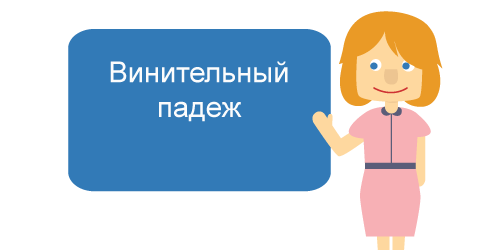
Russian cases
Free course to learn all Russian cases
Lesson 1:
Accusative - Part 1
The accusative case of inanimate nouns
!! This course requires basic knowledge of Russian. If this is not your case, we recommend you our Basic Russian Course.

Introduction to the accusative case
When is the accusative case used?
Generally, we use the accusative case...
- to express the direct object: Я ви́жу мою́ кни́гу - I see my book.
- after some prepositions to show the place "someone goes to": Мы идём в кино́ - We are going to the cinema.
What will we learn in this lesson?
We are going to learn the accusative case of different inanimate nouns (that is, names of non-living objects). We will also learn the accusative of pronouns.

Russian vocabulary
Read, listen and repeat the vocabulary of this lesson:
If you still don't know how to read the Cyrillic alphabet, visit our course on how to read Russian.
паде́ж
case
имени́тельный паде́ж
nominative (Nom.)
вини́тельный паде́ж
accusative (Ac.)
бо́льше
more / anymore
сок
juice
вода́
water
пи́во
beer
пи́цца
pizza
хлеб
bread
мо́жет быть
maybe
люби́мый
favourite
вку́сный
tasty / yummy
краси́вый
nice / beautiful
кста́ти
by the way
ну...
well...

Dialogues in Russian
Read, listen and pay attention to the cases used
Extra help: highlighted cases + tables
We have highlighted the words in accusative. You can also look up these grammar tables while you read the dialogues:
*These tables will open in a new window
Dialogue 1
Приве́т, Майкл. Я о́чень хочу́ пить! Что у тебя́ есть?
Hi Michael. I really want to drink! What do you have?
До́брый ве́чер, Ма́ша. Что хо́чешь пить? У меня́ есть сок, вода́ и пи́во.
Good evening, Masha. What do you want to drink? I have juice, water and beer.
Я хочу́... я хочу́ сок, во́ду... и пи́во я то́же хочу́. А ещё хочу́ есть! Что у тебя́ есть?
I want... I want juice, water... and I also want beer. And I also want to eat! What do you have?
Ну... у меня́ есть пи́цца и хлеб. Что хо́чешь?
Well... I have pizza and bread. What do you want?
Я хочу́ пи́ццу и хлеб. Я всё хочу́!
I want pizza and bread. I want everything!
Dialogue 2
Ты зна́ешь, я хочу́ купи́ть стол и ла́мпу. За́втра я иду́ в магази́н.
You know, I want to buy a table and a lamp. Tomorrow I'm going to a shop.
Мо́жет, хо́чешь купи́ть мой стол? Он мне бо́льше не нра́вится.
Maybe you want to buy my table? I don't like it anymore.
Нет, я не хочу́ его́ покупа́ть... Он мне то́же не нра́вится. Но я куплю́ твою́ ла́мпу.
No, I don't want to buy it... I don't like it either. But I buy your lamp.
Извини́, но э́то моя́ люби́мая ла́мпа... Мо́жет, хо́чешь моё кре́сло?
Sorry, but this is my favourite lamp... Maybe you want my armchair?
Ух ты! Э́то о́чень краси́вое кре́сло. Я куплю́ его́.
Wow! It's a very nice armchair. I'll buy it.
Dialogue 3
А́ня де́лала блины́ вчера́. Они́ о́чень вку́сные.
Anya did pancakes yesterday. They are very tasty.
Да... Я люблю́ её блины́. Э́то мои́ люби́мые блины́.
Yes... I love her pancakes. They are my favourite pancakes.
А мои́? Ты их не лю́бишь?
And mine? You don't love them?
Коне́чно, я люблю́ твои́ блины́. А ещё я люблю́ твои́ бу́лочки.
Of course, I love your pancakes. And I love your buns too.
Спаси́бо! Кста́ти, я де́лала бу́лочки сего́дня. Ты хо́чешь?
Thank you! By the way, I did buns today. Do you want?
Да, спаси́бо.
Yes, thanks.
Do you want to learn Russian with the best courses and books?
We recommend you the best Russian course, with 150 videos and personal tutor.
If you love reading, have a look at these books with stories in easy Russian with audio.
If you want to practice your Russian, here you can find exercise books, with key and grammar tables.

Russian grammar
Read the following grammar summary. We will learn the cases from this lesson.
The Accusative Case: Inanimate nouns
In this lesson's dialogues we have seen examples of Nominative (Nom.) and Accusative (Acc.) Case in inanimate nouns (that is, names of non-living objects). These are the most important points to remember about these two Cases:
Inanimate nouns in singular:
- Accusative masculine = Nominative masculine
- Accusative neuter = Nominative neuter
- Feminine: its endings are unique to the Accusative
We have highlighted the endings in the tables for each gender.
Masculine: no endings because Nom. = Acc.
- Э́то мой стол (Nom.). Я ви́жу мой стол (Acc.)
This is my table. I see my table
Feminine: -у -ю
- Э́то моя́ кни́га (Nom.). Я ви́жу мою́ кни́гу (Acc.)
This is my book. I see my book
Neuter: no endings because Nom. = Acc.
- Э́то моё окно́ (Nom.). Я ви́жу моё окно́ (Acc.)
This is my window. I see my window
Inanimate nouns in plural:
- Accusative = Nominative (for all three genders)
We have highlighted the endings in the tables for each gender.
Masculine: no endings because Nom. = Acc.
- Э́то мои́ столы́ (Nom.). Я ви́жу мои́ столы́ (Acc.)
These are my tables. I see my tables
Feminine: no endings because Nom. = Acc.
- Э́то мои́ кни́ги (Nom.). Я ви́жу мои́ кни́ги (Acc.)
These are my books. I see my books
Neuter: no endings because Nom. = Acc.
- Э́то мои́ о́кна (Nom.). Я ви́жу мои́ о́кна (Acc.)
These are my windows. I see my windows

Test
Check how much you have learnt in this lesson:
This Russian course will always be free. Please, share it
When you share our website, you're helping us continue with our project: developing free Russian courses for everyone. Please, invest some seconds of your time in sharing us. Thank you.
|
Contact us Site map Terms of use Privacy policy Shop - Russian school Copyright © www.russianforfree.com All rights reserved. |


